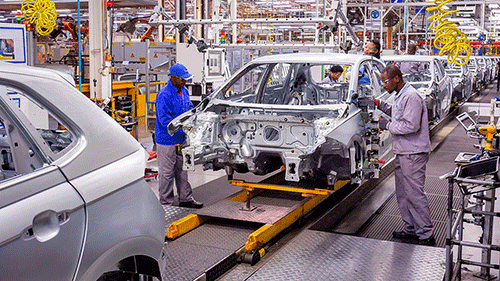A memorandum of understanding (MoU) was signed virtually yesterday between 12 Automotive Associations within the ambit of the EU–Africa Business Forum 2022 with the aim of driving the development of the automotive industry in Africa.
The automotive sector, whilst key for the industrialisation of Africa, is often associated with several challenges including, persistent market fragmentation, lack of regulatory alignment between African countries and the two continents, industrial and trade policies not conducive to local and foreign investment, lack of access to finance for consumers, local suppliers, and affordability.
However intra-African trade can be bolstered and diversified by developing a Pan African Auto Pact, which aims to expand the African new vehicle market from 1 to 5 million units and connecting African regions for the common good. A “coalition of the willing” will see the development of manufacturing sites and allied industries and services – both for the OEM and supplier sector – and thereby laying the foundation for Pan-African integrated automotive value chains which will incorporate neighboring countries, thus building a regional and continental production network
The launch of the African Continental Free Trade Area (AfCFTA) gives a boost to pan-African trade and investments opportunities, especially for the automotive industry and creates the momentum to stimulate a European-African dialogue between policy makers and important stakeholders. This was one of the catalysts that led to a joint initiative to develop an MoU amongst European and African Automotive Associations, which initially driven by the African Association of Automotive Manufacturers (AAAM), the German Association of the Automotive Industry (VDA) and the German-African Business Association (Afrika-Verein) has now grown into a cooperation between 12 Associations which signed the MoU, which has the support of both the African Union and the European Union.
The MoU encourages enhanced dialogue contributing to the development of a joint plan to grow the automotive sector in Africa, through integration into the global and European value chains resulting in quality jobs. Whilst encouraging a favorable investment climate to support market integration and innovation and the joint creation of models of standardization, harmonisation and safe mobility. Furthermore, it is intended to advance the debate about sustainability whilst considering alternative powertrains and digital solutions and to further develop affordable mobility solutions leading to a viable African vehicle market.
The MoU commits the 12 organisations to work jointly on seven key priorities: The setting-up of a permanent round table between the AU, EU, and industry associations in line with the spirit of an established European-African Business Network that will foster the dialogue between Africa and Europe; To request the EU and African countries governments to pursue trade initiatives through the implementation of existing agreements to increase business opportunities and further expand EU-Africa trade in automotive products; It also commits to advance the integration of African companies into the global value chains and to support the building of the necessary infrastructure and logistics. This will include investment and growth opportunities provided for EU companies partnering with African companies and will result in supply chains being more easily accountable; The MoU further calls on the EU to enhance its support for the implementation of the African Continental Free Trade Area in view of favouring Africa’s industrialisation and the expansion of the African automotive market; Importantly the MoU calls for governments to support knowledge transfer, provide financial resources and give political priority in establishing a pan-African production and trade system that will reinforce and expand existing African automotive value chains; Lastly it encourages the EU to financially support the development of sustainable and smart mobility and affordable vehicle financing solutions to increase the mobility of the population in African cities and support therefore infrastructure development.
Commenting after the signing of the MoU, David Coffey the CEO of AAAM said: “The trade and investment climate in Africa can only be improved together. We are convinced that Africa has great potential to develop a promising automotive industry that will provide long-term employment. The fact that African and European associations have agreed on key points to further develop the industry on the continent is an important milestone. Now political representatives are to support this by creating the framework conditions for the industry to develop and grow”.



